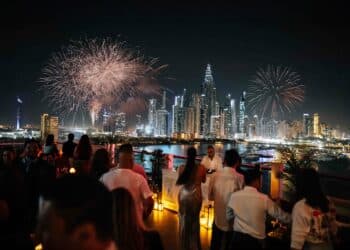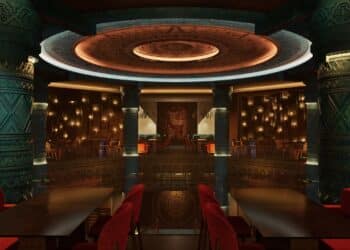The need for new demand drivers in the Middle Eastern hospitality sector is higher than ever, due to the challenges of mounting competition and continued low oil prices.
 That was according to Simon Allison, HOFTEL chairman, who was speaking ahead of the Gulf and Indian Ocean Hotel Investors’ Summit (GIOHIS) 2018 – 29-30 January in the Yas Viceroy, Abu Dhabi (pictured right).
That was according to Simon Allison, HOFTEL chairman, who was speaking ahead of the Gulf and Indian Ocean Hotel Investors’ Summit (GIOHIS) 2018 – 29-30 January in the Yas Viceroy, Abu Dhabi (pictured right).
Allison said: “2018 will be a year where the Gulf and Indian Ocean market faces challenges like never before – the continuing rise of the online travel agents, the spread of home-sharing and serviced apartments, the consolidation of brands, significant supply increases and, in some places, a tough economic environment.
“GIOHIS will allow hotel sector investors to share their insights and solutions in a compact and very transparent forum, lasting less than two days and hearing from some of the region’s top CEOs including Olivier Harnisch, Joe Sita, Suchad Chiaranussati, Khalid Anib, David Anderson, Olivier Chavy, Jalil Mekouar, Simon Coombs and Paul Jones.”
He added that how the GCC economies will drive the leisure and business travel sectors and how hotels will deal with the pressure to fine-tune their offerings to deliver long-term growth will be among the major talking points at the event.
The Middle East, according to Allison, represents a significant opportunity for the hospitality sector due to the ongoing drive for economic diversification away from oil and gas, but, he pointed out, with the world’s highest pipeline of new hotels set to come onstream, the need to differentiate and create new offerings is more important than ever.
Haitham Mattar, CEO of the Ras Al Khaimah Tourism Destination Authority addeed: “The fundamentals for industry growth in the region are good but it is vital that we challenge ourselves as an industry to respond to the needs and expectations of our customers in new ways.
“In RAK, we are creating not only new beach resorts but also adventure tourism experiences including the world’s longest zip line.”
The region is surging ahead, Allison said, with innovative resort projects, such as the proposed new Red Sea islands planned for the Saudi coast, while new industrial sectors are also being stimulated such as new logistics and manufacturing hubs in Bahrain.
Moreover, he added, having focused largely on luxury up to now, many of the region’s leading developers like WASL in Dubai are now moving into more midscale offerings.


































































